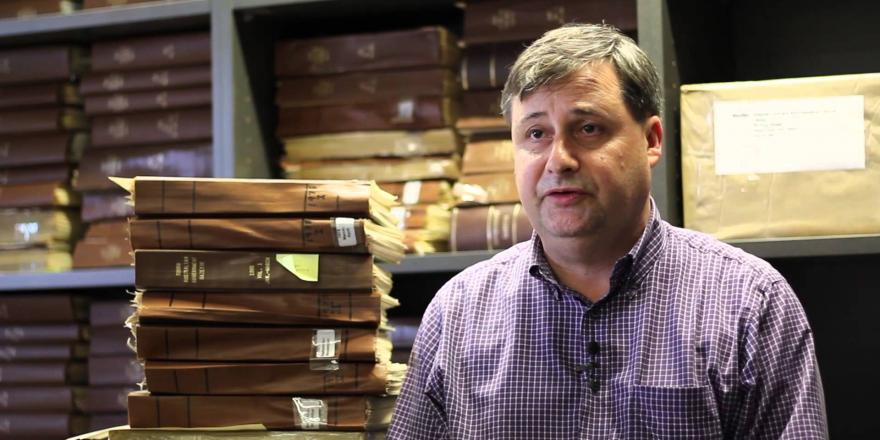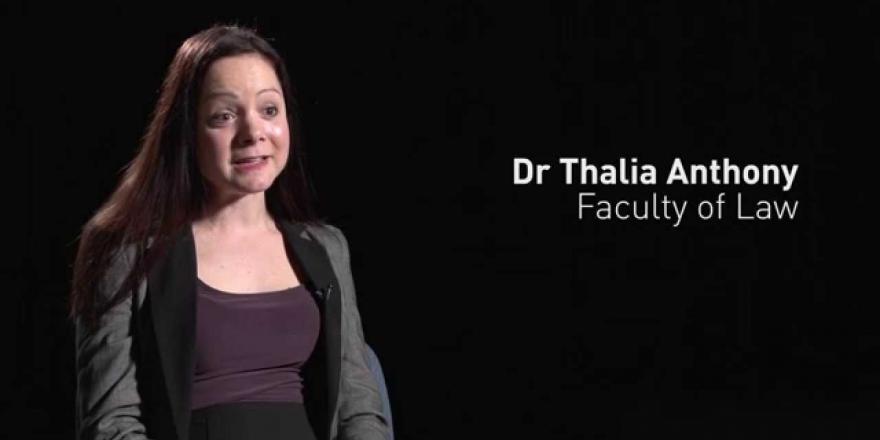UTS Law Research is committed to producing world-leading research and communicating it responsibly and effectively to the wider academic community, national and international policy and lawmakers, and the general public.
UTS Law Research, its professional staff, and its programs are central to UTS:Law’s ongoing commitment to researcher development. Our research culture, competitive funding schemes and development programs support and foster the research excellence of our academics at every stage of their career.
Below is Professor Andrew Mowbray (Professor of Law and Information Technology and Director, AustLII) who co-founded the Australasian Legal Information Institute (AustLII), a joint research initiative of the Law Faculties of UTS and UNSW. Based on research funded by 25 ARC grants, plus contributions and research contracts from industry and other organisations, AustLII provides the national free access legal database, used by the legal profession, government, courts, education institutions and the public.

Transcript for video "UTS Vice-Chancellor's Research Awards 2015 - Andrew Mowbray"
AUSTLII produces the Australian legal database. This is used by everyone from lawyers through to members of the public. It receives approximately 650,000 hits a day, which constitutes about 30 per cent of legal internet traffic in Australia.
AUSTLII tries to have impact both in a policy sense and in a sense of providing just general access to legal materials. From a policy point of view, we feel very strongly that the public has a right to be able to access legal information, but we also have impact in terms of the detail as to how that happens. We do this both in Australia and we try to help international. You know, AUSTLII has helped to establish an organisation called the Free Access to Law movement, which has 50 organisations as members around the world.
One of the fundamental things about AUSTLII is that we believe strongly that the public ought to have free access to legal information. We believe that ignorance of the law is no excuse, so it’s a good idea that the public can genuinely access what the law is. We also attempt to have impact in terms of the detail of how that happens – citation issues, issues as to how you can reliably prove that something’s correct and the like.
Dr Thalia Anthony (Senior Lecturer, Faculty of Law, UTS) has made outstanding contributions to Indigenous legal research and translation of this research into classroom, online and experienced-based learning activities. Signifiers of this integration of her research into teaching are her publications on Indigenous legal education and leadership in international networks which incorporate Indigenous research in legal education.

Transcript for video "UTS Vice-Chancellor's Research Awards 2015 - Thalia Anthony"
A strong aspect of my research is how we can enhance legal education to promote cultural competencies among our students, and I’ve held a number of conferences and published in this area to identify ways in which we can communicate Indigenous experiences through our teaching in the same way that I do it through my research. And I’ve been doing this in criminal law, but also through the design of new subjects like a Jumbunna editorial role, where students are actively involved in editing a Jumbunna law journal and being part of its production and communicating with stakeholders to enhance their professional capacity for working with Indigenous communities.
Students from these subjects, both the core subject of criminal law as well as the elective subjects of the Jumbunna journal and Indigenous People and the Law, which I teach and design, have gone on to work in Aboriginal legal services, native title services, as well as gone on to contribute to their Indigenous communities, not only in leadership roles, which they have contributed to, but also in very different ways, like artistic roles. So I think the function of the subjects and the way in which I’ve tried to incorporate Indigenous world views has had a profound effect on empowering Indigenous students as well as opening up non-Indigenous students to possibilities to contribute to Indigenous justice.
Research
A UTS research strength that embodies the vibrant research culture of the Faculty of Law, its commitment to researcher development and is a central point for its diverse research activities. UTS Law Research was assessed by the Commonwealth Government as a being ‘above world class’ in its 2015 Excellence in Research for Australia (ERA) Initiative.
We are committed to making a critical contribution to understanding and teaching our discipline, shaping policy and law-making, and responsibly informing public debate.
UTS Law Research, its professional staff, and its programs are central to UTS Law’s ongoing commitment to researcher development. Our research culture, competitive funding schemes and development programs support and foster the research excellence of our academics at every stage of their career.
In addition to this, UTS Law offers prestigious and internationally competitive Quentin Bryce Law Doctoral Scholarships, which provide recipients with a generous stipend, travel fund, and the possibility of an additional teaching fellowship.
Research clusters
- Criminal Justice
- Legal Education
- International Law
- Private Law
- Feminist Legal Research
- Migration and Labour Law
Our key areas of research strength cover:
- Private Law
This includes Corporate, Commercial, and Tax Law; Intellectual Property, Media and Communications; Health, Family and Communities; and Regulation of Biotechnologies. - Public Law
This includes Criminal Justice and Criminology; and International Law, Human Rights and the Environment. - Law and Other Disciplines
This includes Law and History; and Law and Culture.
learning.futures
learning.futures is UTS's university-wide approach to blended learning. It aligns future-focused curriculum with informed technology use and has been designed in tandem with a AU$1 billion redesign of campus learning spaces to shape the future of student learning. We've matched new spaces with new learning practices across the whole university.
2 UTS:Law academics were presented with 2015 Vice Chancellor Teaching and Learning Grants;
Thalia Anthony for her project: Building from Indigenous Knowledges in Law: Working Towards Students' Indigenous Cultural Competency in UTS Law Programs
Leanne Houston for her project: Equipping Students for the Real World of Administrative Law by Transitioning from the Substantive to the Practical

